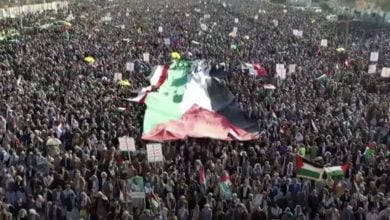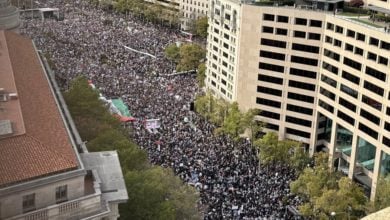Photo: Protest in San Antonio, Venezuela, against U.S. intervention. Credit: Gloria La Riva
On Nov. 21, Venezuelans will participate in the 29th election since the beginning of the country’s Bolivarian Revolution. In these “Mega Elections,” the country’s 23 governorships, 335 mayorships, 253 regional legislative and 2,471 municipal legislative seats — including 69 Indigenous communities — will be up for election. In total, 3,082 seats are to be filled and 70,244 people have presented themselves as candidates from 37 of the 42 political parties in the country. Women represent 49% of the candidates, part of a deliberate process toward fuller women’s equality in the country.
Observers from numerous countries have been invited to accompany the process run, monitored and organized by the National Electoral Council (CNE) and the Bolivarian National Armed Forces (FANB) to assure an organized and safe election. The European Union and United Nations are sending observers. This is the EU’s first time observing Venezuela’s elections even after being invited multiple times.
The CNE is one of the branches, or “powers,” of the revolutionary government of Venezuela. Representative Tania Díaz, journalist and Vice President of Communications for the United Socialist Party of Venezuela (PSUV), recently explained in an interview with Radio Al Aire Libre con Hugo Orejuela that most countries have three branches of government — judicial, legislative and executive. But Venezuela has five branches, which they call the five powers. They include the standard three, but also add the Moral branch and the Elections branch. Díaz explained that the electoral institution — fully scrutinized with mass participation — demonstrates that Venezuela’s democracy is practiced, understood and upheld by the country’s citizenry.
These elections are very important for Venezuela’s electoral and political processes. After the 2019 attempted coup when U.S.-backed right-wing politician Juan Guaidó named himself “president,” the country experienced almost two years of sabotage engineered by Washington and theft of gold and oil reserves and other property.
Despite great hardships caused by the intensified U.S. sanctions and the active participation in that sabotage by Guaidó and other opposition members, the government of President Nicolás Maduro has called repeatedly on the opposition to enter into negotiations and participate in the elections. That engagement and political agreement with the opposition, signed in September 2019, led to the successful process and completion of the December 2020 National Assembly elections, established by the revolutionary government’s Constitution.
At critical moments in Venezuela’s many elections, U.S. imperialism has intervened by instructing the opposition to fully boycott the elections. It has also intensified economic sabotage during those elections to try to influence the population to reject the socialist and progressive alliance headed by the PSUV. That scenario of economic sabotage and staged terrorist violence funded by the United States led to a victory in the 2015 National Assembly elections by the right wing. Upon the seating of the right-wing delegates, they tried to dismantle the progressive laws and economic benefits passed by the previous Assembly.
The objective of the U.S. government’s interference, as exemplified by the farce of Juan Guaidó’s self-appointment as president after President Maduro’s second inauguration in 2019, is to claim that Venezuela’s elections are a farce and to justify further sanctions.
The newly-elected National Assembly was inaugurated in January of this year. It designated a new body of the Supreme Election Tribunal (TSE), the electoral authority that oversees the electoral process, that includes opposition members. The TSE is elected by the National Assembly and is a committee composed of civilians and academics.
Representative Tania Diaz highlighted the importance and purpose of these elections: “It is to consolidate and make clear to those who oppose Venezuela that there is no possibility of change in Venezuela through violent means. That possibility does not exist. Stop assaulting us, stop the criminal economic blockade of the Venezuelan people, stop sanctioning our petroleum industry and all the productive national enterprises. Stop the assault, [presidential assassination] attempts, the armed interventions on our land. That is not the route. Through that route, political change will not happen.
“The only way to change the political regime in Venezuela is presenting a political proposal, convince the electorate and win it through elections. I say this because this is what we are manifesting today with the electoral effervescence that is all over the country, and we will demonstrate it on Nov. 21, so that it is clear to the whole world that Venezuela has what it takes to reaffirm, defend, support and live in a democratic way. We have the right and we have won it through permanent collective struggle. We have 20 years building this political system and making laws which construct this system.”
Socialists mount an impressive campaign
There are 21,159,846 voters in Venezuela who will participate using their 5,108 polling centers and 14,400 voting sites. In the same way that the last National Assembly seats were won overwhelmingly by the PSUV due to block-by-block mass mobilization, and because of the leadership provided in resisting the years-long U.S. economic war, this fall the PSUV is covering those same neighborhoods throughout the country.
These PSUV representatives helped provide aid during the worst of the pandemic and the blockade by distributing food to homes through the CLAP program and checking in on families during quarantine. Now they are walking the blocks to ensure people get involved in the political process. Representative Diaz explained: “It’s not a stranger that knocks on your door. People don’t just knock on your door to get your vote. This is the manifestation of President Hugo Chavez’s vision for the PSUV, which President Maduro continues to carry out. It is not just a vanguard revolutionary party, but also a mass organization that meets the people’s needs and unites them in action. Mobilization efforts and sharpening of the electoral process is signaling to the world that whatever happens here will be done via votes, it will be what the Venezuelan people decide because here we have a democratic institution that is well constructed and understood and is legitimized by our people.”
Progressive forces around the world, including in the United States, support Venezuela’s mega elections process and the revolution begun by Hugo Chávez’s election in 1998. Venezuela’s Bolivarian Revolution is based on a sovereign and revolutionary society. U.S. imperialism’s attacks continue, but no one knows their tricks more than those who have lived decades fighting to defend their self determination by any means necessary.






